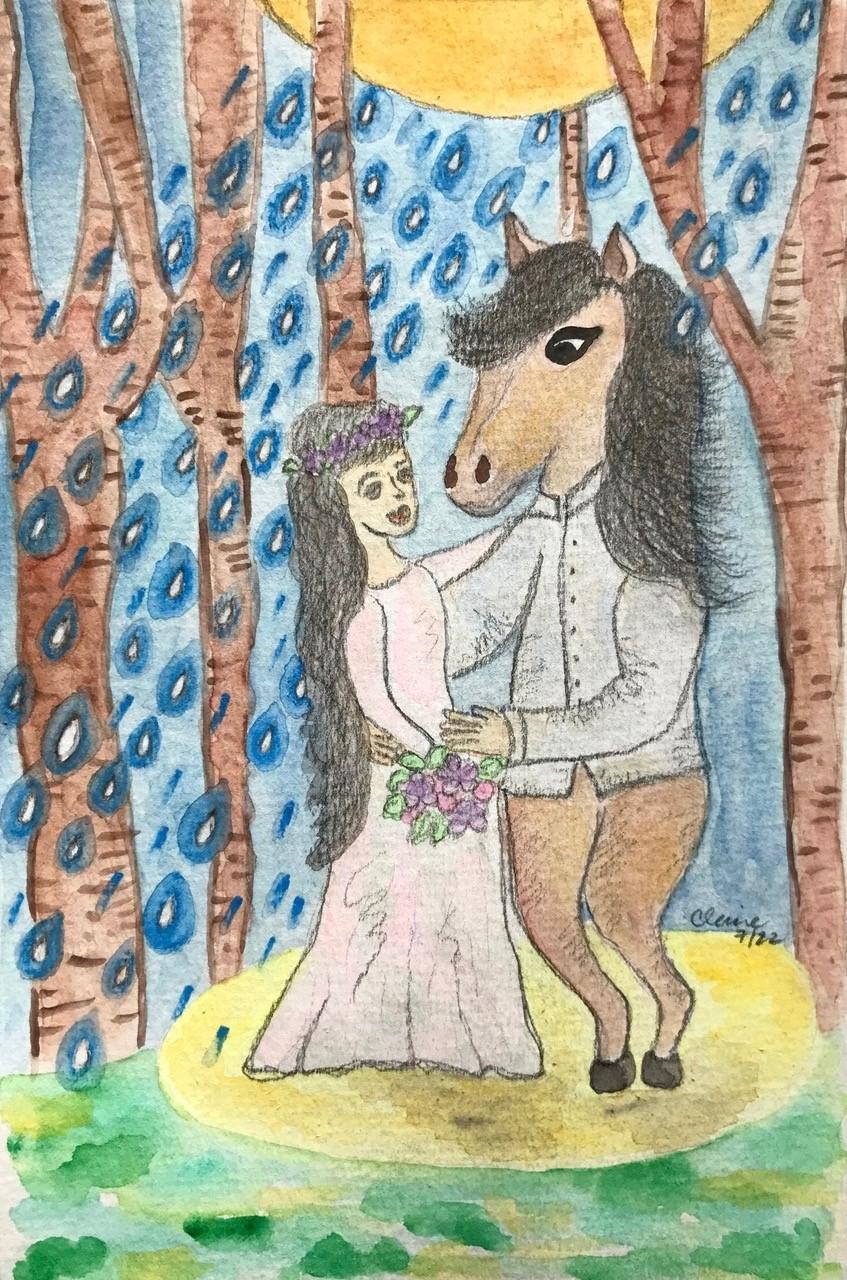
4 minute read
Kasalan ng Tikbalang (A Tikbalang’s Wedding Day) Story and
Deep in the dense mountains lives a creature with a body of a human but bearing the head and hind legs of a horse. Tikbalang is what he is called. His lifetime appointment is to guard the rainforest and all its inhabitants, a huge responsibility given all the egos that live within this sacred space. But he’s built for the task for he is the best of beast: horsepower, strength, agility and tenacity—the animal you chose to bring to battle. He is also the best of man: attractive, intelligent, strategic, protective and persuasive. He is friends with all that live there, but he is their leader first. He is well-respected for he takes his job seriously and is the first on the scene when any kind of danger occurs. Humans, they always find their way into the rainforest. Who can blame them for answering the seductive lure of nature? There’s nothing wrong with that. They only need to be wary. When they mindlessly trespass the Tikbalang's territory and do naughty acts like inflicting harm to the ecosystem or being too rowdy, they will be punished. The Tikbalang curses them with a circuitous route so that they lose their way. It is believed that the single antidote is to turn one’s shirt inside out and only then can a human find their way home. This is just for minor offenses. When you incur his wrath, he can easily send you to another realm.
When a maiden walks into the forest, however, the Tikbalang watches from behind trees, curious about this beauty. She treads gently, appreciating each blossom, communing with every insect, basking in the serenity of her surroundings. There is a calmness about her. “Surely, she can be trusted, can she not?” the Tikbalang asks himself. He allows her to wander some more, and he quietly observes her. Just as she steps into the Tikbalang’s territory, he appears behind the blanket of fog, his mane flowing in the wind. The maiden is startled but is not afraid. She looks into his eyes and calls out, “Hello” with confidence. The Tikbalang keeps a safe distance, wondering, “Why is she not scared of me?” For all who cross his path run in terror at the sight of him. She continues, “My name is Tessa. Your home is beauti-
Advertisement
This simple courtesy earns his trust. He allows her to cross the threshold and he follows her lead. He quietly keeps her company even as day turns into night. He is enchanted by her. He has always lived a solitary, independent life. Never did he realize the delights of companionship. Smitten, he woos her with the finest flowers and exotic fruits from the belly of the forest. He serenades her alongside bird song. He walks with her, graciously giving her a tour of the land, showing off the majesty of the yakal trees, captivates her with a view of the waterfalls and the endless blanket of stars in the midnight sky. She can’t help but blush with appreciation. She looks longingly at him, runs her fingers through his mane and puts her hand lovingly on his cheek. It is believed that if you pluck one of the Tikbalang's golden hairs, he will be subservient to you. But in this case, it is not necessary especially when feelings are involved. The Tikbalang and Tessa … they fall in love. The Tikbalang is torn. He is bound to the forest for this is his calling and a creature like him cannot be accepted in any other place. He may look like a monster, but he understands the value of choice. Could he expect Tessa to give up everything she has?
Tessa, embraced by the peace of the forest and unsurprisingly enamored with a half-man and half-animal, willingly says yes. She is ready to leave the chaotic city life perhaps to escape her past and begin anew. They get married in a flat and secluded area of the forest, sunlight filtering through the canopy of trees. Fireflies illuminate the path. Cicadas croon the bridal march. The Tikbalang wears a white tunic, similar to a caparison worn by horses in the medieval times. Tessa wears a crown of orchids in her hair, the same orchids tucked with passion flowers in the bouquet she carries. Animals and creatures, large and small, surround Tessa and the Tikbalang in a semicircle. The Kapre, a tree-dwelling giant with a fondness for cigars, officiates their union. They exchange rings fashioned from the roots of pine trees, trees that symbolize longevity. When the Kapre declares, “I now pronounce you hus-
band and wife,” they kiss passionately. All the guests applaud and cheer enthusiastically as butterflies flutter about like confetti. The Tikbalang neighs loudly in agreement. On this day, their wedding day, the sun shines brightly as the rain falls simultaneously. A paradox. Could it represent painful tears on a most festive day? That the forest’s bachelor is hitched? That a maiden could not find human love? That the universe was against the romance of beast and woman? Or it can mean tears of joy, the result of love at first sight and of beating the odds. A sun shower—there are brilliant meteorological explanations for this—but a Tikbalang on his wedding day is a much more romantic story. And just as a sun shower passes, a rainbow is never far behind. After all, a Tikbalang deserves a happily ever after, too.







